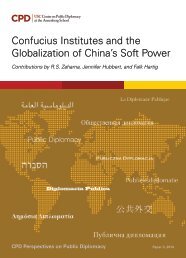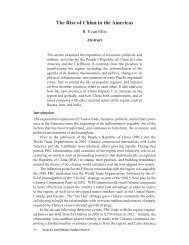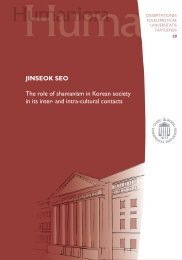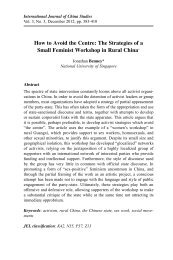JennyChan.PhDThesis.2014.FINAL
JennyChan.PhDThesis.2014.FINAL
JennyChan.PhDThesis.2014.FINAL
Create successful ePaper yourself
Turn your PDF publications into a flip-book with our unique Google optimized e-Paper software.
observers find that young laborers were skilful in combining legalistic and<br />
extra-legal means to advance their individual or collective demands, rather than<br />
tolerating injustice. 94<br />
During the work process, managerial control is crucial to extract labor power and to<br />
procure profit (that is surplus value) in capitalist production. Structurally, the<br />
disciplining of workers to conditions of factory production entails “the social control<br />
of physical and mental powers on a very broad basis.” 95 The subjective or<br />
ideological dimension 96 of work, however, needs to be carefully examined. Michael<br />
Burawoy in his seminal work The Politics of Production succinctly explains:<br />
The crucial issue is that the interests that organize the daily life of<br />
workers are not given irrevocably; they cannot be imputed; they are<br />
produced and reproduced in particular ways. To assume, without further<br />
specification, that the interests of capital and labor are opposed leads to<br />
serious misunderstandings of the nature of capitalist control, if only<br />
because it provides an excuse to ignore the ideological terrain on which<br />
interests are organized…We must investigate the conditions under which<br />
the interests of labor and capital actually become antagonistic. 97<br />
The nature of class opposition, or worker acquiescence, is dynamic; it is not a thing<br />
that exists in a static form. Under the right circumstances, workers share a common<br />
identity on their interests “as between themselves” and “as against other men whose<br />
interests are different from (and usually opposed to) theirs.” 98 In other times, the<br />
unevenness or disjuncture of class experience between workers is observed. 99 In the<br />
University of California Press.<br />
94 Chris King-Chi Chan, 2013, “Contesting Class Organization: Migrant Workers’ Strikes in China’s<br />
Pearl River Delta, 1978-2010,” International Labor and Working-Class History 83 (Spring), pp.<br />
112-36; Chris King-Chi Chan and Pun Ngai, 2009, “The Making of a New Working Class: A Study<br />
of Collective Actions of Migrant Workers in South China,” China Quarterly 198, pp. 287-303; Wang<br />
Jianhua and Meng Quan, 2013, “Xinshengdai ongmingong de Jiti Kangzheng Moshi” (Collective<br />
Resistance Models of a New Generation of Rural Migrant Workers”) 新 生 代 農 民 工 的 集 體 抗 爭 模<br />
式 , Open Times《 開 放 時 代 》No.1. http://www.opentimes.cn/bencandy.php?fid=367&aid=1702<br />
95 David Harvey, 1989, The Condition of Postmodernity: An Enquiry into the Origins of Cultural<br />
Change, Cambridge, MA: Blackwell, p. 123.<br />
96 Michael Burawoy specifies that “any work context” involves three inseparable dimensions: “an<br />
economic dimension (production of things), a political dimension (production of social relations), and<br />
an ideological dimension (production of an experience of those relations).” See his book The Politics<br />
of Production: Factory Regimes under Capitalism and Socialism (1985), London: Verso, p. 39.<br />
97 Michael Buraowy, 1985, The Politics of Production: Factory Regimes under Capitalism and<br />
Socialism, London: Verso, p. 28-29.<br />
98 E. P. Thompson, 1966, The Making of the English Working Class, New York: Vintage, p. 9.<br />
99 Keith McClelland, 1990, “Introduction,” E. P. Thompson: Critical Perspectives, edited by Harvey J.<br />
Kaye and Keith McClelland, Cambridge, England: Polity Press, p. 4.<br />
28






